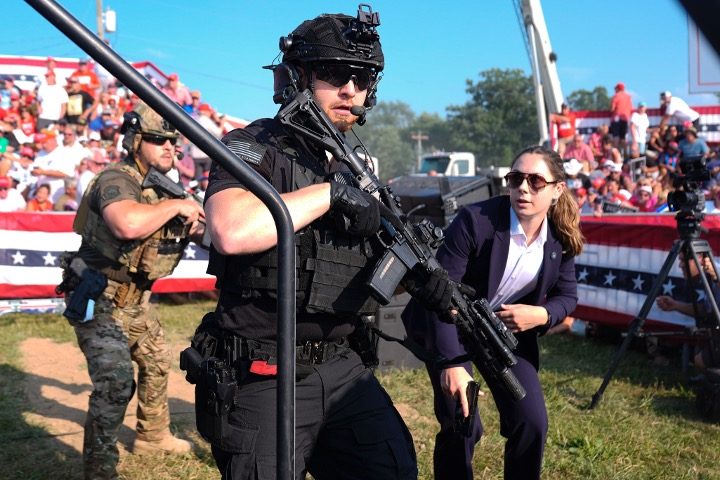
After the Secret Service failed to protect former President Donald Trump from a would-be assassin in July, the agency did what all government agencies do when caught with their pants down: blame it on a lack of funding. Congress, naturally, obliged by giving the agency another $231 million.
But, as with other agencies, the Secret Service’s problem isn’t a lack of funding but a lack of prudence in spending the taxpayer dollars it receives.
Agents Take 10-percent Cut
The Daily Caller reported Wednesday that the Secret Service’s budget has increased by nearly $1 billion over the last decade, yet “only $200 million of that has gone to protective operations.” In other words, the agency has spent 80 percent of its extra funding on things other than safeguarding lives.
Not surprisingly, then, the share of the Secret Service’s budget that has been allocated to protecting people has shrunk from about 50 percent in 2014 to 41 percent in 2024. Moreover, while the agency added around 1,600 employees during that same period, the number of employees assigned to protective details decreased by more than 300, a cut of almost 10 percent.
Thanks to presidential campaigns and a UN General Assembly session, the Secret Service currently has at least 36 ongoing protective details for government officials, candidates, their families, and assorted others.
According to RealClearPolitics’ Susan Crabtree, between decreased manpower and increased protective operations,
A large number of Secret Service employees are working so hard — many seven-day work weeks with no time off — that they’ve already hit their “supermax limit” for overtime pay, meaning they can no longer receive overtime for their work. One special agent characterized that phenomenon as essentially working for free.
Even as its agents have been stretched to the limit, the Secret Service has found money for such things as “headquarters, management, and administration” ($200 million in 2024); “Mission Support” ($600 million in 2024); and “Other Services from Non-Federal Sources” ($149 million in 2023). The agency is also sending employees on taxpayer-funded trips to Walt Disney World for an LGBTQ+ “workplace summit” next week.
Not-so-quick Fix
Is another $231 million really going to make a difference just a month before the election, especially when the Secret Service seems incapable of directing funding where it’s most needed?
“You could throw money at the problem all day long, but it’s not going to immediately rectify what you have going on right now,” former Secret Service agent Michael Matranga told the Daily Caller. “With this new budget, they’re going to hire 400 new agents. It takes almost a year to get an agent through training, and it’s going to take a couple years to where they can even do a site advance, or, God forbid, a lead advance on their own. So, we’re going to hire 400 new people, and that’s gonna resolve our problem? No, it’s not.”
The Secret Service’s manpower shortage may have contributed to its decision to force Trump to move a recent rally in Wisconsin from an outdoor venue to an indoor one. Trump blamed the switch on “Democrats … interfering with [his] campaign.” But a senior Secret Service official told Axios, “The agency was never configured to provide such an elevated level of protection for an increasing number of protectees.”
The Secret Service has other problems besides misspent dollars and too many protective details. Former agent Tim Spiess told the Daily Caller that “the agency is seeing a wave of retirements.” At the same time, the website wrote, it has “a noticeable culture of nepotism”:
“In the Secret Service, the level of nepotism that’s there, and the hiring of legacy applicants, where somebody’s mom or dad or uncle was on that job, is rampant,” [former agent Richard] Staropoli said, adding that not all of these individuals are cut out for the rigors of the job. “At some point, you’re overloaded with people that are just dead weight. Where do you put them? And then what happens is, through attrition, these people start to ascend the ranks and start to get promoted, and that’s where the Secret Service is.”
Change Agents
Spiess claimed the Secret Service successfully dealt with a threat level similar to today’s when he staffed some of former President Barack Obama’s appearances. Can the agency do anything to get back on track?
Reducing the number of “low level protective details” such as those for Cabinet members or the president’s relatives would help alleviate some of the stress, Matranga told the Daily Caller.
He further suggested reassessing the agency’s dual mission of combating financial crimes and protecting certain individuals. Transferring the financial duties to another agency would free up resources and allow the Secret Service to concentrate on what it does — or did — best.
In addition, the Secret Service could get reinforcements from other federal agencies, call in extra agents from field offices, or use more local law-enforcement officials, former agents told the Daily Caller. These all have their drawbacks, however. A whistleblower told Senator Josh Hawley (R-Mo.) that most of the agents assigned to Trump at his Butler, Pennsylvania, rally were Homeland Security personnel whose training consisted of a two-hour webinar. There were also communications breakdowns between the Secret Service and local police at the same event.
Government agencies are highly resistant to change. But with people’s lives at stake, one hopes the Secret Service proves to be the exception to the rule.


